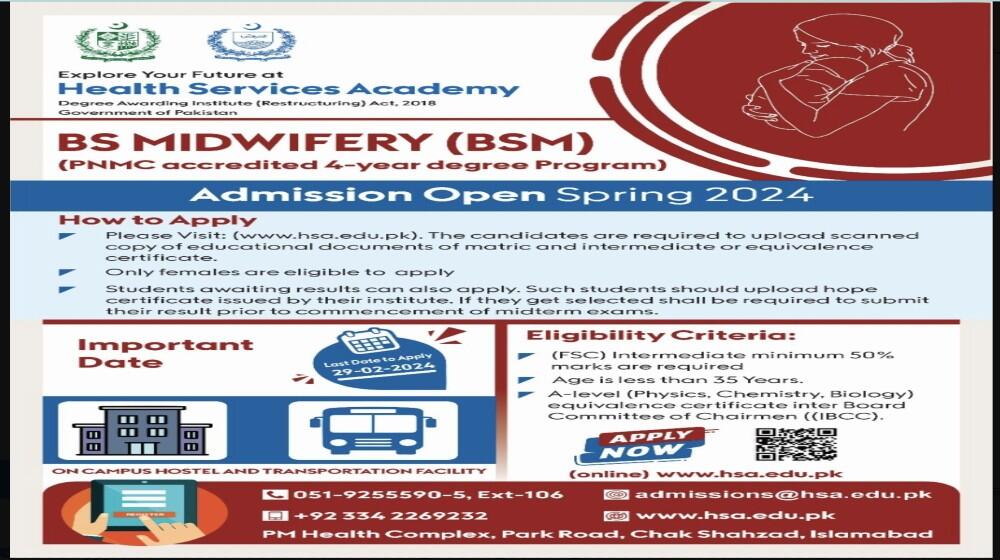Amna Sharif, 25, from a remote village in Chitral, Khyber Pakhtunkhwa, represents the silent, struggling voices of many women. Pregnant with her first child, she navigates a world where healthcare is a luxury, not a given. The nearest healthcare facility is 60 kilometers away, from her village with no guarantee of finding a qualified midwife upon arrival. Her story unfolds as she embarks on a journey, fuelled by determination and the hope for a safe childbirth.
Amna’s story intertwines with the situation of Sabrina Mubashir, a 19-year-old girl, also from Chitral who has just finished high school against the odds of poverty. Sabrina aspires to be a midwife. “I see many women in my area struggling to access midwifery services because of long distances and because of limited numbers of midwives. I want to be a midwife so that I help save the lives of mothers and babies in my community,” said Sabrina.
Now there is a glimmer of hope for both Amna and Sabrina. The Health Services Academy in Islamabad is launching a pioneering four-year Bachelor of Science in Midwifery degree program. Students, hailing from diverse backgrounds will embark on this path with dreams of making a difference in their communities. This monumental achievement has been made possible with technical support from the model for the Midwifery Faculty Development Program led by UNFPA Pakistan and the Burnet Institute, an Australian-based medical research institute.
The project has been funded by Global Affairs Canada’s support under UNFPA’s “Sihaat Mand Khaandaan (SMK) Project: Healthy Families for Pakistan Through Accelerating Sexual Reproductive Health (SRH) and Family Planning (FP) Services (2020-2024)”. The SMK aims to enhance the reproductive health and rights of women, adolescents, and youth in areas with poor reproductive health indicators.
UNFPA Representative in Pakistan Dr. Luay Shabaneh said that at the core of the maternal health system lies a crucial element that refers to the ability to manage timely outreach services effectively and that this ensures carrying out a noble mission to help women with maximum efficiency. “Reflecting on the UNFPA journey through midwifery support globally, a path filled with countless memories and experiences, I have come to understand its profound impact on maternal morbidity and mortality,” said Dr. Shabaneh. He said midwifery is not just helping women to deliver but also bringing new life. “Women have the right to say where and how they birth their children. All women are entitled to safe delivery, and midwives are the soldiers guarding this right who do not only assist in making babies being born but also helping women to be mothers. One key performance indicator of the maturity of the health system is the way a particular doctor's openness and attitude toward midwifery,” said the UNFPA Representative.
He also asserted that midwifery was brought to life by many inspirational midwife intellects and leaders. “For example, Mary Cronk initiated a new independent practice in midwifery after facilitating over 1,600 births. Denis Wash, an associate professor in midwifery published the best-selling book on evidence-based care for normal labour and birth, and Ina May who have been known as the “mother of authentic midwifery”, is a key figure in the field of out-of-hospital births. Therefore, the investment in midwifery is a strategic option to improve maternal health and reduce maternal mortality. Pakistan has been struggling for decades to fill the gap in skilled attendant births. I am very excited to know that finally an undergraduate degree in midwifery has been launched. This is one of the most important programmes in high education in Pakistan,” said Dr. Shabaneh.
The Health Services Academy has announced that the new degree program has been recognized by the Higher Education Commission of Pakistan. The main objective of this program is to establish midwifery education in accordance with national and international best practices, as well as the standards set by the International Confederation of Midwives (ICM). By doing so, the program aims to promote excellence in evidence-based midwifery practice, teaching, and leadership. The higher education programs in midwifery will serve as a model for Pakistan and the surrounding region.
The degree program spans over four years and eight semesters, where students will take courses in basic sciences, social sciences, and health sciences, with a focus on obstetrics, gynaecology and neonatal health. Each semester has both theoretical and practical components in various settings. Additionally, in the final semester, students will have the option to choose electives in either maternal or new-born health. A range of course formats are available, including classroom, distance learning via web conferencing, and print-based self-study courses. Teaching methods include lectures, small group tutorials, self-directed activities and practical learning experiences in both skills laboratory and clinical practice settings.
--Pilirani Semu-Banda


